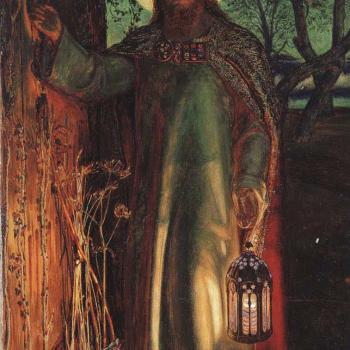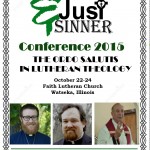Adapted from a discussion from the Twitterverse; starting in medias res…
The real issue diving the Lutherans and the Reformed is not “single v. double predestination”, but the doctrine of the Person and Work of Christ. Whose nature does Christ assume? Human nature. Are you a human? Yes? Then He assumed your nature. He assumed your humanity. This means that He is for you. The Nicene Creed does not say that Christ became a man (although He did, in the sense of becoming a discrete personage, and this must be affirmed); no — the Nicene Creed says that Christ became MAN. He took on your flesh, whoever you are. Christ was imputed with the sins of those whose nature, whose flesh, He assumed, and He assumed the nature and flesh of every single human person.
A brief look at Romans 5 is helpful here:
v. 12: “Therefore, just as sin came into the world through one man, and death through sin, and so death spread to all men because all sinned.”
— Universal transgression, universal contagion due to sin.
v. 13-14: “…for sin indeed was in the world before the Law was given, but sin is not counted where there is no law. Yet death reigned from Adam to Moses, even over those whose sinning was not like the transgression of Adam, who was a type of the one who was to come.”
— Again, the same point as above.
v. 15: “But the free gift is not like the trespass. For if many died through one man’s trespass, much more have the grace of God and the free gift by the grace of that one man Jesus Christ abounded for many.”
— “Many” here is a synecdoche for “all”; it’s easy to see this: did many but not all die through one man’s trespasses? Of course not; no one believes this. Thus the parallel structure is many to many, many meaning all.
v. 16: “And the free gift is not like the result of that one man’s sin. For the judgment following one trespass brought condemnation, but the free gift following many trespasses brought justification.”
— Here’s the clincher: universal judgment follows universal trespass; universal (objective, not subjective) justification follows from Christ’s atoning work. Do not bypass this grammar here: “[T]he free gift following many trespasses brought justification.” Subject, verb, object — this is not difficult to grasp.
v. 17: “For if, because of one man’s trespass, death reigned through that one man, much more will those who receive the abundance of grace and the free gift of righteousness reign in life through the one man Jesus Christ.”
— Here the subjective aspect of justification is at least hinted at: “those who receive the abundance of grace and the free gift of righteousness” — grace and righteousness are received through faith alone, and they cannot be received through anything else. But the receiving of the thing does not create the thing. God’s hidden will is manifest on the cross; it is externalized. Christ is the Word. You want to know what God thinks about you? Look at Him dying on the Cross, and KNOW, more than anything can be known, that He does it for you.
v. 18: “Therefore, as one trespass led to condemnation for all men, so one act of righteousness leads to justification and life for all men.”
Selah.
— No, this does not point to universal salvation; it points to the objective nature of justification, which, if it is not received, avails for nothing. But look at this parallelism of all to all! “Condemnation for all men” — just for some? No. For all, for all are sinners. “[J]ustification and life for all men” — just for some? No. Again — for all, for all are sinners. And Christ came to seek and to save the lost. While we all were still sinners, Christ died for us.
v. 19: “For as by the one man’s disobedience the many were made sinners, so by the one man’s obedience the many will be made righteous.”
— Again, “many” means “all” here. Try arguing that it’s not. I’ll wait. I don’t think anyone is going to say that only some were made sinners by Adam’s disobedience. If you believe that, I won’t be the one who tries to talk you out of it. I’m just going to tell you to have a nice day.
v. 20-21: “Now the Law came in to increase the trespass, but where sin increased, grace abounded all the more, so that, as sin reigned in death, grace also might reign through righteousness leading to eternal life through Jesus Christ our Lord.”
— Christ is God’s incarnate “Yes.” Believe Him. Believe in Him.
(All Scripture citations above are ESV.)
+SDG+












